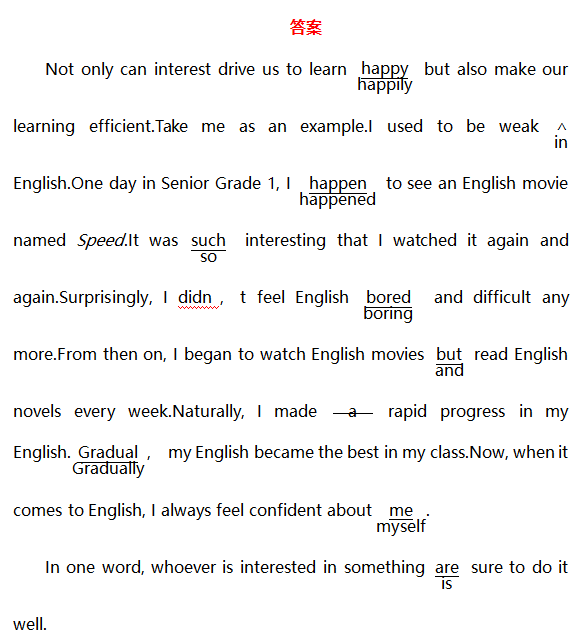2020高职高考英语提分练习,附答案
2019-10-21 17:55:17 来源:广东睿博教育高职高考辅导班 评论:0 点击:
高职高考提分练习 | 阅读理解+完形+语法填空+改错

今天小编给大家准备了英语阅读理解+完形填空+语法填空+短文改错的相关练习题,大家要认真对待,我们一起攻克英语!
Ⅰ.阅读理解
(2019·山东济宁摸底)After nearly half a century behind the wheel, Hisao Matsumoto, 85, is not ready to stop driving.“I’m not that old yet,” he says.“I still have 15 more years to go till I reach 100.” Mr.Matsumoto is one of more than 5 million drivers aged 75 or older.A million more will be on the roads by 2021.Worried, the police are trying to persuade many of them out of driving, because over 75s are twice as likely to cause a fatal accident as younger drivers, according to the National Police Agency (NPA).
Nearly half of older drivers who caused fatal accidents had signs of cognitive impairment (认知障碍).Hundreds of older drivers turn the wrong way into motor ways every year.In January an 85 year old man steered his vehicle into oncoming traffic on a country road, hitting a car and two schoolgirls.Police believe he mistook the accelerator for the brake.The man’s family said he had rejected their requests to hand over his keys many times.
Such stubbornness is common, notes Kazunori Iwakoshi, who heads an NGO that supports elderly drivers.Many drivers argue that they have never had an accident and it is unfair to do that, so they resent themselves being cast aside.
Since last March over 75s renewing their licenses must take cognitive tests to screen for dementia (老年痴呆).The NPA expects these changes to take 15,000 drivers off the road each year.Last year more than 250,000 over 75s gave up their licenses after their families’ constant stream of persuasion, says Mr.Iwakoshi.His organization publishes a check list for elderly drivers, aimed at getting them to assess their responses themselves.
Mr.Matsumoto is lucky.His city gives pensioners unlimited access to public transport.However, thousands of elderly people are stuck in rural communities with no buses.
[语篇解读] 本文为说明文。因为超过75岁的司机发生致命事故的可能性是年轻司机的两倍,所以日本警方正在努力说服他们中的许多人放弃开车。为此,去年3月对超过75岁的人更新他们的执照,进行认知测试来筛查痴呆症。经过努力,许多老年人放弃了驾照。但对于住在无公交车的农村的老年人来说,不开车出行又是一个问题。
1.Why do the police try to persuade elderly drivers to stop driving?
A.To encourage younger drivers to drive safely.
B.To reduce the number of deadly accidents.
C.To introduce the National Police Agency.
D.To stress the significance of safe driving.
B [细节理解题。根据第一段最后一句“Worried, the police are trying to persuade many of them out of driving, because over 75s are twice as likely to cause a fatal accident as younger drivers,”(警方正在努力说服他们中的许多人不要开车,因为超过75岁的司机发生致命事故的可能性是年轻司机的两倍。)由此可知,这是因为老年司机发生事故的几率比年轻人高,所以为了减少致命事故才劝说老年司机不要开车了。]
2.Which word is closest in meaning to the underlined word “resent” in Paragraph 3?
A.resemble
B.support
C.injure
D.dislike
D [猜测词义题。根据第三段的Many drivers argue that they have never had an accident and it is unfair to do that, so they resent themselves being cast aside.可知,许多年老的司机认为他们从未发生过事故,这样做是不公平的,所以他们痛恨不让他们自己开车。由前面年老的司机认为不公平的,可知他们不会喜欢。分析选项可知resent的意思是“不喜欢,讨厌,痛恨” 。]
3.What does Paragraph 4 mainly talk about?
A.Tests to assess elderly drivers’ responses.
B.Families’ contributions to traffic safety.
C.Ways to renew licenses for elderly drivers.
D.Measures to control the number of elderly drivers.
D [主旨大意题。本段主要讲述为了让老年司机放弃开车,对超过75岁的老人进行认知测试考核来筛查痴呆症。在家人的劝说下有许多老年人放弃了开车。由此可知,对于控制老年司机人数日本政府和社会采取了相应的措施。]
4.What is implied about the restriction to elderly drivers in the last paragraph?
A.It can cause some new problems.
B.It is popular among elderly drivers.
C.It will do elderly drivers more harm than good.
D.It brings about easy access to public transport.
A [推理判断题。根据最后一段最后一句However, thousands of elderly people are stuck in rural communities with no buses.的内容可知,让老年人放弃开车是好的,但对成千上万生活在没有公共汽车的农村社区的老年人来说他(他们的出行)就是一个问题了。]
Nearly half of older drivers who caused fatal accidents had signs of cognitive impairment (认知障碍).Hundreds of older drivers turn the wrong way into motor ways every year.In January an 85 year old man steered his vehicle into oncoming traffic on a country road, hitting a car and two schoolgirls.Police believe he mistook the accelerator for the brake.The man’s family said he had rejected their requests to hand over his keys many times.
Such stubbornness is common, notes Kazunori Iwakoshi, who heads an NGO that supports elderly drivers.Many drivers argue that they have never had an accident and it is unfair to do that, so they resent themselves being cast aside.
Since last March over 75s renewing their licenses must take cognitive tests to screen for dementia (老年痴呆).The NPA expects these changes to take 15,000 drivers off the road each year.Last year more than 250,000 over 75s gave up their licenses after their families’ constant stream of persuasion, says Mr.Iwakoshi.His organization publishes a check list for elderly drivers, aimed at getting them to assess their responses themselves.
Mr.Matsumoto is lucky.His city gives pensioners unlimited access to public transport.However, thousands of elderly people are stuck in rural communities with no buses.
[语篇解读] 本文为说明文。因为超过75岁的司机发生致命事故的可能性是年轻司机的两倍,所以日本警方正在努力说服他们中的许多人放弃开车。为此,去年3月对超过75岁的人更新他们的执照,进行认知测试来筛查痴呆症。经过努力,许多老年人放弃了驾照。但对于住在无公交车的农村的老年人来说,不开车出行又是一个问题。
1.Why do the police try to persuade elderly drivers to stop driving?
A.To encourage younger drivers to drive safely.
B.To reduce the number of deadly accidents.
C.To introduce the National Police Agency.
D.To stress the significance of safe driving.
B [细节理解题。根据第一段最后一句“Worried, the police are trying to persuade many of them out of driving, because over 75s are twice as likely to cause a fatal accident as younger drivers,”(警方正在努力说服他们中的许多人不要开车,因为超过75岁的司机发生致命事故的可能性是年轻司机的两倍。)由此可知,这是因为老年司机发生事故的几率比年轻人高,所以为了减少致命事故才劝说老年司机不要开车了。]
2.Which word is closest in meaning to the underlined word “resent” in Paragraph 3?
A.resemble
B.support
C.injure
D.dislike
D [猜测词义题。根据第三段的Many drivers argue that they have never had an accident and it is unfair to do that, so they resent themselves being cast aside.可知,许多年老的司机认为他们从未发生过事故,这样做是不公平的,所以他们痛恨不让他们自己开车。由前面年老的司机认为不公平的,可知他们不会喜欢。分析选项可知resent的意思是“不喜欢,讨厌,痛恨” 。]
3.What does Paragraph 4 mainly talk about?
A.Tests to assess elderly drivers’ responses.
B.Families’ contributions to traffic safety.
C.Ways to renew licenses for elderly drivers.
D.Measures to control the number of elderly drivers.
D [主旨大意题。本段主要讲述为了让老年司机放弃开车,对超过75岁的老人进行认知测试考核来筛查痴呆症。在家人的劝说下有许多老年人放弃了开车。由此可知,对于控制老年司机人数日本政府和社会采取了相应的措施。]
4.What is implied about the restriction to elderly drivers in the last paragraph?
A.It can cause some new problems.
B.It is popular among elderly drivers.
C.It will do elderly drivers more harm than good.
D.It brings about easy access to public transport.
A [推理判断题。根据最后一段最后一句However, thousands of elderly people are stuck in rural communities with no buses.的内容可知,让老年人放弃开车是好的,但对成千上万生活在没有公共汽车的农村社区的老年人来说他(他们的出行)就是一个问题了。]
Ⅱ.完形填空
Dr.K was one of my favorite professors in college.He was unique because he admitted telling lies in his __1__.I remembered the __2__to his teaching at the beginning of his first class:“Now let me __3__ how I teach.From today to the class right before finals, I’ll put a __4__ into each of my lectures.Your job is to try and __5__ me in the Lie of the Day.”
And thus __6__ our ten week course.Early in the course,the Lie of the Day was usually obvious—__7__ causing a forest of raised __8__ to challenge the lie.Dr.K would smile, saying,“Very good! In fact, the opposite is __9__.”
As the course progressed, __10__,_the Lie of the Day became less __11__.Every once in a while, a lecture would __12__ with nobody catching the lie.On such days, we would all sit in __13__,while Dr.K, looked quite __14__ with himself and announced, “Ah ha! Each of you has one lie in your __15__.Discuss what it might be, and I will tell you next Monday.” Those lectures forced us to __16__what we had set down in our notebooks the following week.
It’s years since I __17__.While my knowledge taught by Dr.K has faded over time, the lessons will always stay __18__ with me.“Experts” can be __19__ and say things that sound right.So build a habit of __20__ new information and check it against things you already accept as a fact.
[语篇解读] K教授是作者在大学最喜欢的教授之一,他用自己独特的教学方式,使学生对他的课印象深刻。
1.A.memories B.lectures C.stories D.textbooks
B [根据后面的整个故事内容可知,K教授允许学生在他的课堂上找出他撒谎的地方,因此选项lectures符合语境,而且后面多处出现该词。]
2.A.introductionB.way C.accessD.devotion
A [教授在第一堂课开始时对他的教学方法进行了介绍。]
3.A.rememberB.declare C.explainD.conduct
C [根据后面的内容“From today to the class right before finals...in the Lie of the Day.”可知,教授向大家解释了他如何进行教学:从今天到期末前的每堂课里都会有一个谎言,大家的任务就是尽量把它找出来。]
4.A.puzzleB.joke C.surpriseD.lie
D [本文从头至尾都在谈论K教授在课堂上欢迎同学们找谎言。]
5.A.catchB.help C.supportD.punish
A [上文提到每堂课教授都会有一个谎言,后文中的“...causing a forest of raised...to challenge the lie.”也说明教授是让同学们尽量去发现他说谎的地方,故选A。]
6.A.passedB.continued C.beganD.arose
C [上一段K教授在第一节课开始时介绍了自己的教学特色,因此接下来自然是课程的开始,故选C。]
7.A.graduallyB.suddenly C.actuallyD.immediately
D [教授要求同学们在他的课堂上尽量找出他说谎的地方,这种教学方法很新颖独特,大家当然会立即响应,都想挑战,故选D。]
8.A.eyesB.hands C.headsD.books
B [在课堂上,同学们会举手回答问题,故选B。]
9.A.trueB.interesting C.easyD.serious
A [lie的反义相关词就是true,故选A。]
10.A.besidesB.therefore C.thusD.however
D [根据前面的progressed与后面的became less可知,前后是转折关系,故选D。]
11.A.attractiveB.noticeable C.difficultD.special
B [随着课程的推进,教授的谎言越来越难发现,后面的with nobody catching the lie说明了一点,故选B。]
12.A.proveB.meet C.endD.connect
C [上一句说明谎言越来越难发现,接下来进一步说明情况,有时一节课结束了都没有人发现谎言,故选C。]
13.A.surpriseB.relief C.comfortD.silence
D [从后面教授说的话可知,我们都安静地坐在那里,等教授发言。故选D。]
14.A.pleasedB.disappointed C.annoyedD.surprised
A [前文提到,同学们很难找到教授的谎言,甚至一节课结束了都没有人发现任何谎言;而下文“Ah ha!Each of you has one lie in your...”说明教授对此很满意,故选A。]
15.A.diariesB.notes C.homeworkD.articles
B [根据后面的what we had set down in our notebooks中的notebooks可知,学生的笔记里有谎言,故选B。]
16.A.go throughB.look for C.find outD.turn in
A [go through浏览;look for寻找;find out查明;turn in上交。教授说学生的笔记里有谎言,让学生讨论。由此可推断,这迫使学生不得不去浏览笔记,找出问题所在。故选A。]
17.A.marriedB.retired C.graduatedD.moved
C [从下一句的“While my knowledge taught by Dr.K has faded over time,the lessons will always stay...”可推知,虽然毕业好几年了,教授教给作者的知识也被淡忘了,但是作者对那些课还记忆犹新,故选C。]
18.A.funnyB.fresh C.usefulD.important
B [随着时间的推移,教授教给作者的知识已经被淡忘了,但是作者对那些课还记忆犹新,fresh符合语境,故选B。]
19.A.responsibleB.greedy C.patientD.wrong
D [从后面的check it against things you already accept as a fact可知,通过与那些你已经作为事实接受了的东西作对比来检查新信息,也就是对专家们讲的东西不要全盘接受,他们也可能出错。故选D。]
20.A.believingB.spreading C.challengingD.organizing
C [专家们讲的东西也可能是错的,所以我们要养成一种质疑新信息的习惯,要对它们进行检验。故选C。]
And thus __6__ our ten week course.Early in the course,the Lie of the Day was usually obvious—__7__ causing a forest of raised __8__ to challenge the lie.Dr.K would smile, saying,“Very good! In fact, the opposite is __9__.”
As the course progressed, __10__,_the Lie of the Day became less __11__.Every once in a while, a lecture would __12__ with nobody catching the lie.On such days, we would all sit in __13__,while Dr.K, looked quite __14__ with himself and announced, “Ah ha! Each of you has one lie in your __15__.Discuss what it might be, and I will tell you next Monday.” Those lectures forced us to __16__what we had set down in our notebooks the following week.
It’s years since I __17__.While my knowledge taught by Dr.K has faded over time, the lessons will always stay __18__ with me.“Experts” can be __19__ and say things that sound right.So build a habit of __20__ new information and check it against things you already accept as a fact.
[语篇解读] K教授是作者在大学最喜欢的教授之一,他用自己独特的教学方式,使学生对他的课印象深刻。
1.A.memories B.lectures C.stories D.textbooks
B [根据后面的整个故事内容可知,K教授允许学生在他的课堂上找出他撒谎的地方,因此选项lectures符合语境,而且后面多处出现该词。]
2.A.introductionB.way C.accessD.devotion
A [教授在第一堂课开始时对他的教学方法进行了介绍。]
3.A.rememberB.declare C.explainD.conduct
C [根据后面的内容“From today to the class right before finals...in the Lie of the Day.”可知,教授向大家解释了他如何进行教学:从今天到期末前的每堂课里都会有一个谎言,大家的任务就是尽量把它找出来。]
4.A.puzzleB.joke C.surpriseD.lie
D [本文从头至尾都在谈论K教授在课堂上欢迎同学们找谎言。]
5.A.catchB.help C.supportD.punish
A [上文提到每堂课教授都会有一个谎言,后文中的“...causing a forest of raised...to challenge the lie.”也说明教授是让同学们尽量去发现他说谎的地方,故选A。]
6.A.passedB.continued C.beganD.arose
C [上一段K教授在第一节课开始时介绍了自己的教学特色,因此接下来自然是课程的开始,故选C。]
7.A.graduallyB.suddenly C.actuallyD.immediately
D [教授要求同学们在他的课堂上尽量找出他说谎的地方,这种教学方法很新颖独特,大家当然会立即响应,都想挑战,故选D。]
8.A.eyesB.hands C.headsD.books
B [在课堂上,同学们会举手回答问题,故选B。]
9.A.trueB.interesting C.easyD.serious
A [lie的反义相关词就是true,故选A。]
10.A.besidesB.therefore C.thusD.however
D [根据前面的progressed与后面的became less可知,前后是转折关系,故选D。]
11.A.attractiveB.noticeable C.difficultD.special
B [随着课程的推进,教授的谎言越来越难发现,后面的with nobody catching the lie说明了一点,故选B。]
12.A.proveB.meet C.endD.connect
C [上一句说明谎言越来越难发现,接下来进一步说明情况,有时一节课结束了都没有人发现谎言,故选C。]
13.A.surpriseB.relief C.comfortD.silence
D [从后面教授说的话可知,我们都安静地坐在那里,等教授发言。故选D。]
14.A.pleasedB.disappointed C.annoyedD.surprised
A [前文提到,同学们很难找到教授的谎言,甚至一节课结束了都没有人发现任何谎言;而下文“Ah ha!Each of you has one lie in your...”说明教授对此很满意,故选A。]
15.A.diariesB.notes C.homeworkD.articles
B [根据后面的what we had set down in our notebooks中的notebooks可知,学生的笔记里有谎言,故选B。]
16.A.go throughB.look for C.find outD.turn in
A [go through浏览;look for寻找;find out查明;turn in上交。教授说学生的笔记里有谎言,让学生讨论。由此可推断,这迫使学生不得不去浏览笔记,找出问题所在。故选A。]
17.A.marriedB.retired C.graduatedD.moved
C [从下一句的“While my knowledge taught by Dr.K has faded over time,the lessons will always stay...”可推知,虽然毕业好几年了,教授教给作者的知识也被淡忘了,但是作者对那些课还记忆犹新,故选C。]
18.A.funnyB.fresh C.usefulD.important
B [随着时间的推移,教授教给作者的知识已经被淡忘了,但是作者对那些课还记忆犹新,fresh符合语境,故选B。]
19.A.responsibleB.greedy C.patientD.wrong
D [从后面的check it against things you already accept as a fact可知,通过与那些你已经作为事实接受了的东西作对比来检查新信息,也就是对专家们讲的东西不要全盘接受,他们也可能出错。故选D。]
20.A.believingB.spreading C.challengingD.organizing
C [专家们讲的东西也可能是错的,所以我们要养成一种质疑新信息的习惯,要对它们进行检验。故选C。]
Ⅲ.语法填空
Apples are widely grown in many countries and they are usually picked 1.______ hand.However, robots may soon join the human apple pickers.On 2.______ whole, one robot can pick the same amount as a team of ten people, but doesn’t require a salary.The 3.______(amaze) robot sucks apples off trees and it won’t damage them.It can even spot ripe apples and pull them from trees just 4.______ you can.The apple picking robot will have a great influence on the farming industry.Orchard (果园) owners are 5.______ (extreme) happy about it, for farm labor is getting harder 6.______(find).
Many people are worried that the 7.______ (appear) of robots might result in their being replaced in one way or another.However, a lot of good is coming with it as well.Robots often make life safer.Robotic replacements can increase productivity while 8.______(reduce) risk.So long as we keep promoting progress in a way that helps humans,positive change 9.______(follow).
Scientists put it into historical perspective:“Look at the history of agriculture dating back to the 1800s.Machinery has changed how harvesting is done,and huge 10.______(benefit)to society have come from that.”
[语篇解读] 机器人越来越多地出现在人们的日常生活中,例如苹果采摘机器人。机器人的出现不仅能提高效率,还能降低风险。
1.by [考查介词。很多国家都广泛种植苹果,并且它们通常是靠手工采摘的。固定短语by hand表示“用手工”,符合句意。此题容易误填with,with后常接具体的工具,with后面的名词有单复数形式的变化。例如:We write with our hands.]
2.the [考查冠词。on the whole表示“整体上,大体上,基本上”,是固定用法,故应用the。]
3.amazing [考查形容词。神奇的机器人把苹果从树上吸下来,而且还不会损坏它们。空处所填词作定语,修饰robot,表示机器人的特征,故应填amazing(令人惊奇的)。]
4.as [考查状语从句。它甚至可以找出成熟的苹果并像人们一样将苹果从树上摘下来。从属连词as在此引导方式状语从句,表示“像……一样”。]
5.extremely [考查副词。句中的happy为形容词,应用副词对其进行修饰。]
6.to find [考查非谓语动词。果园主人为此非常高兴,因为农场劳动力越来越难找。for后的分句实质上是“sb./sth.+be+形容词+to do”结构的变体,该结构中,当do与sb./sth.为动宾关系时,不定式通常用主动形式表示被动意义,故填to find。]
7.appearance [考查名词。根据句意、空前的the及空后的of可知,此处应填名词,动词appear的名词形式是appearance。]
8.reducing [考查非谓语动词。用机器人代替人工作不仅可以提高生产效率,还可以降低风险。分析句子结构可知,此处是非谓语动词作时间状语。Robotic replacements与reduce是主谓关系,非谓语动作与谓语动作同时存在,故用reducing。]
9.will follow [考查动词的时态和语态。条件状语从句用一般现在时表示将来,主句应用一般将来时,且positive change与follow为主谓关系,故填will follow。]
10.benefits [考查名词的单复数。句中and连接两个并列分句,在第二个分句中谓语动词为have come,因此空格处应用名词的复数形式。]
Many people are worried that the 7.______ (appear) of robots might result in their being replaced in one way or another.However, a lot of good is coming with it as well.Robots often make life safer.Robotic replacements can increase productivity while 8.______(reduce) risk.So long as we keep promoting progress in a way that helps humans,positive change 9.______(follow).
Scientists put it into historical perspective:“Look at the history of agriculture dating back to the 1800s.Machinery has changed how harvesting is done,and huge 10.______(benefit)to society have come from that.”
[语篇解读] 机器人越来越多地出现在人们的日常生活中,例如苹果采摘机器人。机器人的出现不仅能提高效率,还能降低风险。
1.by [考查介词。很多国家都广泛种植苹果,并且它们通常是靠手工采摘的。固定短语by hand表示“用手工”,符合句意。此题容易误填with,with后常接具体的工具,with后面的名词有单复数形式的变化。例如:We write with our hands.]
2.the [考查冠词。on the whole表示“整体上,大体上,基本上”,是固定用法,故应用the。]
3.amazing [考查形容词。神奇的机器人把苹果从树上吸下来,而且还不会损坏它们。空处所填词作定语,修饰robot,表示机器人的特征,故应填amazing(令人惊奇的)。]
4.as [考查状语从句。它甚至可以找出成熟的苹果并像人们一样将苹果从树上摘下来。从属连词as在此引导方式状语从句,表示“像……一样”。]
5.extremely [考查副词。句中的happy为形容词,应用副词对其进行修饰。]
6.to find [考查非谓语动词。果园主人为此非常高兴,因为农场劳动力越来越难找。for后的分句实质上是“sb./sth.+be+形容词+to do”结构的变体,该结构中,当do与sb./sth.为动宾关系时,不定式通常用主动形式表示被动意义,故填to find。]
7.appearance [考查名词。根据句意、空前的the及空后的of可知,此处应填名词,动词appear的名词形式是appearance。]
8.reducing [考查非谓语动词。用机器人代替人工作不仅可以提高生产效率,还可以降低风险。分析句子结构可知,此处是非谓语动词作时间状语。Robotic replacements与reduce是主谓关系,非谓语动作与谓语动作同时存在,故用reducing。]
9.will follow [考查动词的时态和语态。条件状语从句用一般现在时表示将来,主句应用一般将来时,且positive change与follow为主谓关系,故填will follow。]
10.benefits [考查名词的单复数。句中and连接两个并列分句,在第二个分句中谓语动词为have come,因此空格处应用名词的复数形式。]
Ⅳ.短文改错
Not only can interest drive us to learn happy but also make our learning efficient.Take me as an example.I used to be weak English.One day in Senior Grade 1, I happen to see an English movie named Speed.It was such interesting that I watched it again and again.Surprisingly, I didn’t feel English bored and difficult any more.From then on, I began to watch English movies but read English novels every week.Naturally, I made a rapid progress in my English.Gradual, my English became the best in my class.Now, when it comes to English, I always feel confident about me.
In one word, whoever is interested in something are sure to do it well.


In one word, whoever is interested in something are sure to do it well.


上一篇:典型病句归类练习60题(附答案详解),3+证书同学收藏起来!
下一篇:高职高考英语高分提能组合练习|附答案
- 0

- 0

- 0

- 0

- 0

- 0

- 0

- 0





